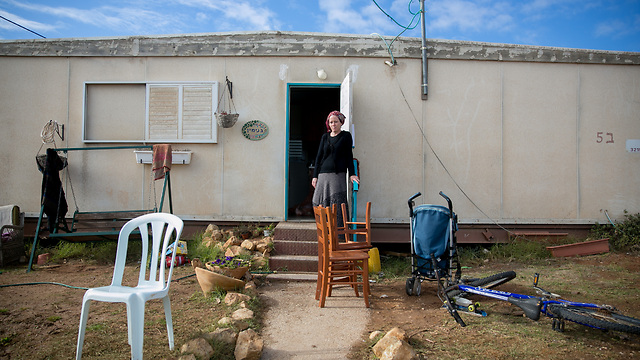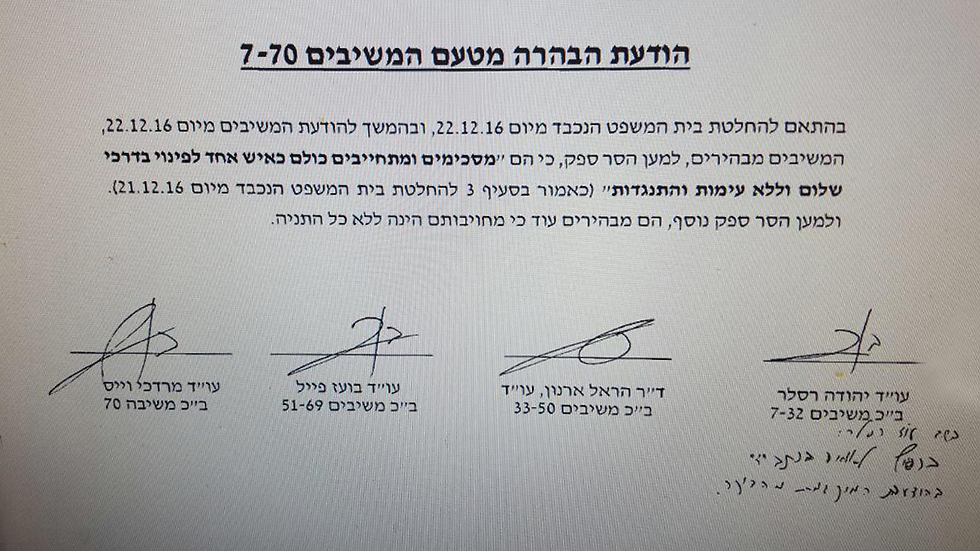
Amona residents commit to peaceful evacuation without condition
High Court of Justice was unhappy with settlers' initial declaration, which appeared to condition peaceful evacuation in the state fulfilling its own commitments to the Amona residents, leading the outpost to issue a new declaration.
On Thursday morning, the residents issued a similar declaration to the court, made at the request of the judges.
The High Court is currently deliberating on the state's request to extend the deadline for the illegal outpost's evacuation by 45 days in an effort to implement the willing evacuation compromise reached with the residents.
"To remove any doubt," the residents wrote, "all of the respondents—the residents of Amona—see themselves are committed by the signatures of the elected leaders of the town to the evacuation agreement and the advancement of the plan to legalize Amona."
They further committed to "peaceful evacuation without any conflict and resistance, this in accordance with the decision made by the community."
However, in their initial statement, the residents noted that they are "convinced the state will also meet its commitments to build alternative housing for the use of the Amona residents, as well as to the other commitments detailed in the agreement signed between the sides."The High Court judges said this addition indicates the residents were conditioning their peaceful evacuation on the state fulfilling its own commitments.
"This was not the statement that was requested yesterday. The court, even if it grants the postponement request, was not asked to address the legality of the agreement and the possibility of its implementation. The declaration the residents were asked to deliver was to be made in unequivocal language."
This, in turn, led the residents to issue the amended statement.
The only obstacle now in the way of implementing the agreement reached with the settlers, which will include the immediate construction of temporary housing for 24 of Amona's families in a nearby plot, is objections by the Palestinian land owners.
"This request to postpone the evacuation—which was filed four days before the deadline set in the ruling, and after the state had two years to carry it out—is a new record in the disintegration of even the appearance of maintaining values like the rule of law, equality, protection of property rights, and fairness," said the Palestinian land owners' response, filed with the help of the legal NGO Yesh Din.
Yesh Din’s representatives claimed that granting an extension to the evacuation deadline would be akin to surrendering to the threats made by the Amona residents.
"One can only imagine how would the state respond if a common citizen—who does not have the connections and political backing the residents of Amona enjoy—threatened the authorities with resistance to the execution of a court ruling," the NGO wrote.
"In fact, there is no need to imagine. Israel has been scarred by difficult evacuations of poor citizens who, for financial reasons, have been issued with evacuation orders—in Kfar Shalem and Giv'at Amal (both neighborhoods in Tel Aviv), in the Bedouin village Al-Araqeeb in the Negev, and of course in the Palestinian sector in the West Bank."
Yesh Din and the Palestinian land owners also attacked the compromise agreement itself. "The state is planning on committing a blatant violation of trust by stealing private lands that belong to Palestinians and giving them to those who have already proven they would apply any means necessary to invade others' lands, refuse to leave, and even threaten in making it difficult to carry our judicial orders," they wrote. "It's hard to think of a more brutal violation of trust. This is a completely immoral and illegal act."












